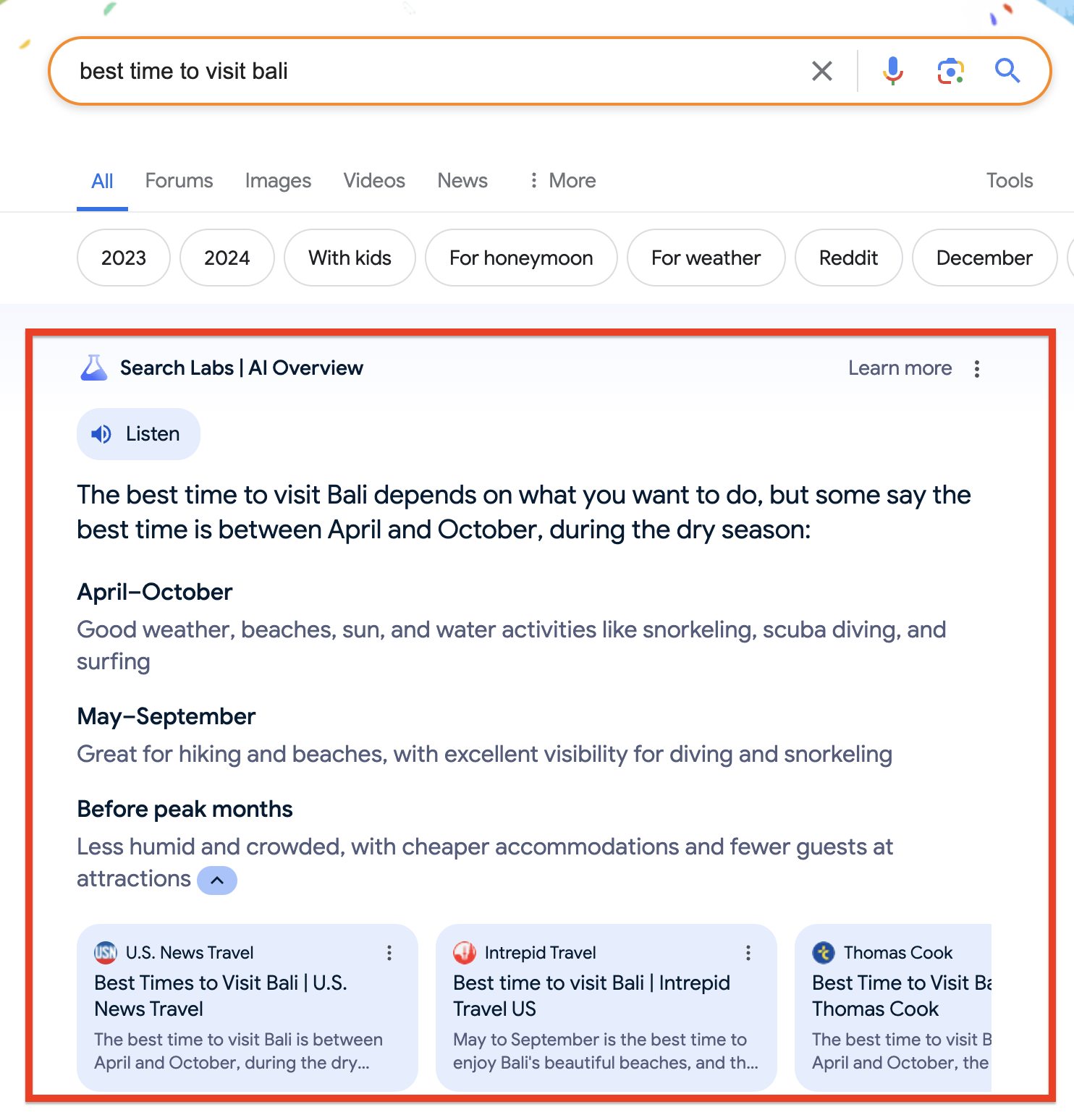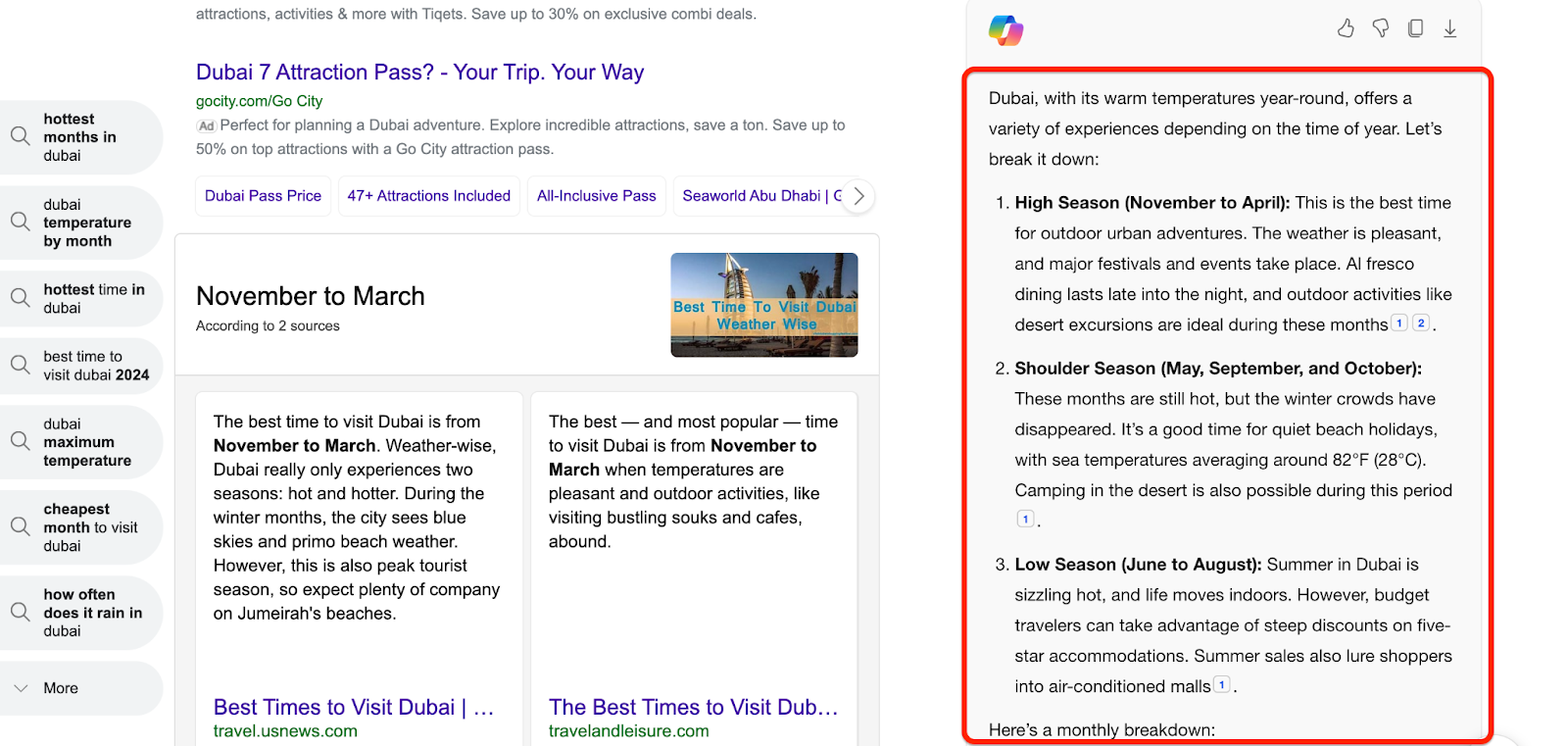Search engines are constantly evolving, but the scale of change we have seen since last year is unprecedented. Search Generative Experience (SGE) and AI overviews have already replaced SERPs for 10% of all search queries on Google. ChatGPT’s integration with Bing also means that many user queries are now being answered in the chatform format.
This is undoubtedly having an impact on websites who rely on website traffic from the SERPs. It’s speculated that the SGE is eventually going to replace most of the SERPs. Luckily though, this change is still in its infancy, and there’s still time. Website owners that pivot now to new ways of doing SEO will still be able to come through unscathed.
But where do you start? In this article, we’ll break down how AI is revolutionizing search and what it means for your SEO strategy. We’ll also show you how to leverage AI to improve your SEO efforts and make it your ally rather than a threat. Finally, we will leave you with tips to start adapting your SEO strategy to accommodate all these new changes.
Let’s dive in.
Understanding the Connection of Artificial Intelligence to Search
AI and SEO are connected in more than one way. Machine learning in particular has been a part of Google’s algorithm since 2001, affecting how websites rank and what SERPs are shown to users.
Even before SGE, search engines used AI-powered machine learning models and natural language processing to understand user queries and provide relevant results.
Together, these technologies have enabled search engines to rank web pages based on factors like quality, authority, relevance, and user intent for a long time.
Here are all the ways AI shapes google algorithm’s core functions:
- Ranking:
AI algorithms analyze user behavior. They also look at user preferences and other third-party data. This helps them to:
- Rank search results better.
- Ensure the most relevant results are displayed first.
- Enhances the overall search experience for users and affects how websites are ranked.
You can read more about how AI impacts rankings here.
- Indexing:
AI helps search engines understand the content at a deeper level, allowing for more accurate indexing of web pages.
According to the AI Index Report 2024, AI has surpassed human performance in several benchmarks.
This includes image classification. It also includes understanding English, which is key to the indexing process.
- Personalization:
AI-based search personalization in search helps enhance user experience and increases customer engagement and conversions. .
What Has Changed Now?
With the introduction of AI Overviews and the Search Generative Experience (SGE) in Google — AI will play a monumental role in not only how search engines rank web pages but also how website owners do SEO. Strategies that aimed at getting people to click on search results (like crafty headlines and meta descriptions) will no longer be effective in the future.

Image source: screenshot
Bing also has its own version of AI Overviews, called Copilot, which is a conversational AI search tool that offers comprehensive results for complex questions and commands.

Image source: personal screenshot
Many SEO consultants think that the SGE will replace the traditional search experience for all ‘Why,’ ‘How,’ and ‘What’ searches. Local and commercial searches are likely still going to show the SERPs.
A study by Search Engine Journal also suggests that the SGE will not impact different industries the same way. For instance, most industries had a SGE coverage of 80%, with the beauty industry having a coverage of 94.43%. At the same time, the coverage for the finance vertical was only 47%. They did, however, find that the coverage grew from 22% to 47% in over 9 months.
Do All These Changes Spell the Doom of SEO?
No. As long as people want to search for information online, search engine optimization will always be necessary.
While it’s true that the SGE can’t distribute traffic to multiple web pages in top spots of the SERPs like the traditional search experience, websites that do get cited in the answers will still see a lot of visibility.
SEOs need to start focusing on optimizing their content with a stronger focus on question-based queries and natural language to rank in the age of the SGE. The way you optimize for the SGE is similar to how you will optimize content for voice search. Focus on including questions naturally in the H2 and H3s, and answer them in a conversational way.
Furthermore, you’ll need to stop thinking narrowly about SEO as a single marketing channel. In the age of AI overviews, it’s more important than ever to develop a cross-channel marketing approach and diversify your traffic sources. You should actively consider integrating SEO with multi-channel marketing, where you leverage social media, email, and other channels to reach audiences where they hang out.
Here’s what Nabil Jalil, founder of blackgridseo has to say about the future of SEO:
“AI will continue to play a significant role in SEO. Search engines will become even more sophisticated in understanding and interpreting content, user behavior, and intent. It will also be important to optimize for new forms of search, such as voice search and visual search, as these technologies continue to evolve and become more widely adopted.”
The Role of AI Tools in the Future of SEO
Another way AI has drastically changed the way SEO is being done now is by introducing free content creation tools in the game. Based on language learning models (LLMs), tools like ChatGPT allow anyone to produce content with a click of the button.
While the accuracy of the information is not reliable, these tools significantly reduce the time taken to produce digital content. You will still need expert editors to make the content helpful and factually correct, but this process is still much faster than having a human writer produce content from scratch without AI. Not to mention, much cheaper and scalable.
Whereas a human being could only churn out a few pieces a week, with AI tools, anyone can produce hundreds of rough drafts in a few hours.
How to Use AI for SEO?
While AI is changing search itself, it has also made it much easier to do SEO now. Core tasks like keyword research, content creation, and ideation can now be done with the help of AI. This saves a lot of time and money that would be otherwise spent on these tasks.
Here are some ways you can leverage AI tools for your own business:
- AI-Powered Keyword Research
AI tools can pull up data on keywords you supply, provide you a list of top keywords to go after, and even help you gather keywords from your competitors’ websites. You can also ask these tools to analyze the search intent of keywords or uncover emerging search trends.
- Automated SEO Audits
AI-driven SEO audit tools simplify checks by spotting issues and optimization opportunities. They analyze website structure, content, and performance, offering steps for improvement.
You can save time and resources by automating audits and ensuring search engine optimization.
Tools like Semrush and Moz can come in handy for automated SEO audits.
- AI-Driven Link Building:
AI boosts link-building by analyzing data and finding top backlink sources.
It enhances anchor text, proposes content, and automates outreach. This is crucial for successful campaigns.
- AIO
AIO refers to the process of creating content through AI tools but having a human editor edit it before it’s published. This approach allows you to control the accuracy and brand voice of your content, while still taking advantage of AI tools.
Note: This approach is in keeping with Google’s stance on AI-generated content. It says it’s not against AI as long as the content is helpful and created for people. AI content that’s left unchecked can be a target of Google’s spam updates, such as the March 2024 spam update, which saw a significant low-quality AI content pages go down significantly.
Google aimed to reduce such content in search results by 40%. To do this, Google targeted content that seemed to be created more for search engines than for people.
We recommend editing all your AI-generated content in accordance with Google’s guidelines for creating people-first content, including EEAT to safeguard your website from the wrath of such updates.
If you’re not sure how to do it yourself, reach out to us. We at Unframed Digital have extensive guidelines for AI content and ensure that it mimics human writing styles.
Challenges and Ethical Considerations of Using AI for SEO
Sure, AI has meant a lot of advancements in SEO. However, there’s a school of thought that suggests that using AI tools is unethical, and does more harm than good. These are the concerns some users have:
- Privacy Concerns
Privacy concerns surrounding AI are a big concern because:
- AI can collect and use users’ personal data, such as browsing history, location, and preferences, without consent or disclosure. This violates user privacy and security.
- It can be used to create or spread fake or misleading content.

- Algorithm Bias
Another potential challenge with AI in SEO is the risk of algorithm bias.
AI algorithms are trained on data. And if that data contains biases, those biases can be reflected in the algorithm’s outputs.
For instance, an AI trained on mostly male voices might struggle to accurately understand female voices in searches.
In the context of search, this can prevent some groups or views from appearing in search results.
In SEO, these biases can reinforce stereotypes, limit diversity, and affect content visibility.
- Impact on search engine rankings
AI content creation tools, such as ChatGPT, Midjourney, JasperAI, and OwlyWriter, can produce text-based or visual content based on written prompts using natural language processing and machine learning in a fraction of seconds. But the thing is, everyone’s using them now.
Content created at this scale is not easy to process for search engines, which have limited crawling and indexing resources.
Such a massive amount of content makes it difficult for them to detect and filter low-quality, duplicate, or spammy content accurately.
This can affect how fast they index or rank your web pages.
- Transparency and Accountability
As a virtual entity, AI can’t be held responsible for misleading statements, biases, and harm caused by them. This means that there are not many comprehensive legal solutions available for people who are impacted negatively by AI.
How to Adapt to Future AI-Led Search Trends
Here are a few upcoming trends to pay attention to:
- AI-Driven User Experience:
AI-driven user experience is a way of creating personalized and engaging experiences for users based on their behavior, preferences, and intent.
AI can help you analyze user data, provide tailored content and recommendations, and improve user satisfaction and retention.
To use AI for UX, you can:
- Use Vertext AI Agents and Dialogflow CX to create and deploy generative AI experiences grounded in your data.
- Use Google Analytics to measure and optimize your user experience metrics.
- Conversational AI and Search:
Conversational AI and search are ways of interacting with users through natural language, either text or voice. It can help you provide faster and more accurate answers to user queries, as well as offer new features and opportunities for search users and marketers.
To use conversational AI and search to your benefit, you can use Contact Center AI to build and deploy conversational AI agents that can handle complex questions and commands.
- Voice and Visual Search:
Voice and visual search are ways of searching that allow users to use their voice or images as the search query. Voice and visual search can help you reach new audiences, improve user convenience and accessibility, and enhance user engagement and loyalty.
To take advantage of voice and visual search, you need to use tools like Google Speech-to-Text and Google Cloud Vision to enable your website and content to understand and process voice and image inputs.
Additionally, you can also use tools like Schema.org and Google My Business to optimize your website and content for voice and visual search results.
You can follow our guide to learn how to optimize your content for voice search in detail.
- Predictive Analytics in SEO:
Predictive analytics in SEO is a way of using data, statistical algorithms, and machine learning techniques to forecast future outcomes based on historical data.
It can help you identify market trends, user behavior, and search engine algorithm changes and optimize your SEO strategies accordingly.
To leverage predictive analytics, you can use tools like Google Trends and Google Keyword Planner to conduct keyword research and topic analysis.
Similarly, you can also use Screpy to monitor and measure your SEO performance and receive suggestions for SEO improvements.
5. Ethical AI in SEO:
Ethical AI in SEO is using AI technologies transparently, fairly, and responsibly while respecting user privacy and ensuring the accuracy and integrity of information. It can help you build and maintain user trust and data confidentiality, as well as comply with ethical and legal standards and guidelines.
Tip: You can use Google AI principles and Google Search Essential guidelines (previously known as Webmaster guidelines).
As AI technologies advance, they offer the potential to enhance SEO strategies.
However, you need to use them responsibly and consider user privacy and experience.











